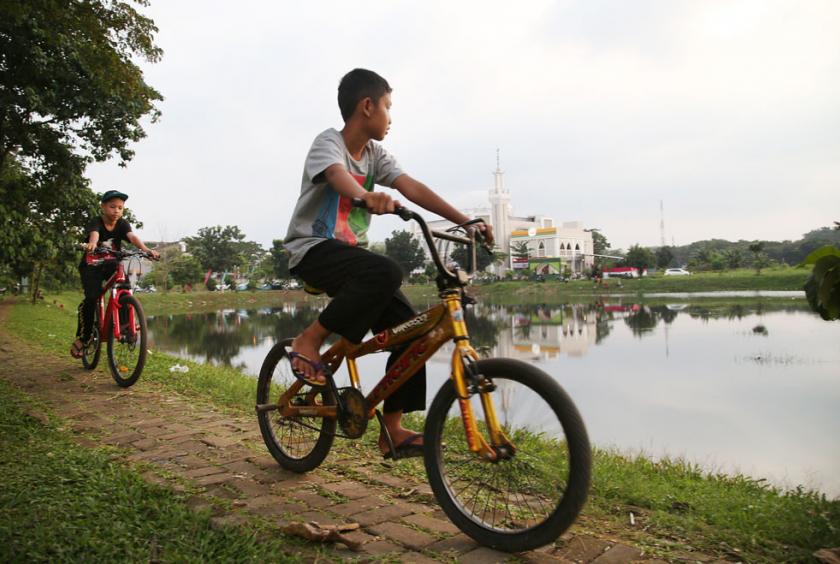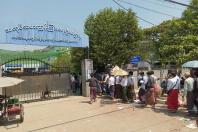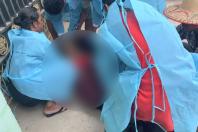
JAKARTA (The Jakarta Post) -The sound of drums beating and people "singing" awoke me at 2 a.m. I got up, stepped out of the house and followed the noise, strolling along the streets of Jakarta.
I caught sight of a man on a motorcycle beating a drum, while another was listening to a prayer on his phone. A few steps more and I came across a group of children singing, jumping, dancing, drumming and throwing leaves in the air. Full of energy and joy, they were shouting “Sahur! Sahur!”, trying to wake people for the predawn meal.
It is Ramadan, Islam’s holy month, during which Muslims fast during the day. The practice is believed to bring the faithful closer to Allah and absolve them of their sins. It is also a time for spiritual reflection, praying and gathering with family and friends.
Ramadan directs Muslims to resist the temptation of human pleasures like drinking, eating, smoking and sex while they are fasting in order to help improve self-control. Other bad habits like lying, arguing, using bad language or crying should also be avoided to build self-discipline and become a better person.
Young children, the elderly and menstruating or pregnant women, however, are excluded from the obligation to fast during the holy month.
The fast begins before sunrise at imsak (the start of the daily fast), shortly before the call to subuh (dawn prayer), and ends with the call to maghrib (sunset prayer). Ramadan falls during the ninth month of the Muslim calendar, which is based on a lunar cycle of 29 or 30 days that varies from year to year.
For a European Christian staying in Indonesia, which has the world's largest Muslim population, Ramadan offers an exciting cultural experience. For the first time in my life, I participated in fasting for 14 hours one day. Therefore, I stopped eating at 4:30 a.m., taking my last sip of water and putting my cigarettes away. Imsak had begun.
I had been dreaming about delicious cakes and pies all night long. Mistakenly fearing hunger and nicotine withdrawal, it turned out that hydration was my major problem. With an outside temperature of 31 degrees Celsius and general circulation problems, I decided to listen to my body and had some water in the afternoon.
Every year in Austria – where I come from – Christmas is an exceptional season. People storm the supermarkets and shop like they are closing forever. I guess I somehow expected a similar situation during Ramadan in Jakarta.
Lo and behold, the world did not stop turning. The streets were still crowded, the shops were still open, nobody seems to be running around hectically. Yet, some changes are apparent.
The local culinary scene has changed; the guy across the street who sells delicious martabak (filled, thick pancake) is gone. During the daytime, many food stalls are closed or have their windows covered with curtains out of respect for those who are fasting.
In their place, new pop-up markets sell snacks and drinks like es buah, a sweet, pink beverage made of coconut water, fruits and some kind of jelly. Some bars stop serving alcohol, and the prices for fresh fruits and vegetables have doubled at wet markets.
People light fireworks during the day, while the Indonesian Air Force jets fly overhead during the night to wake people.
Thirsty, lacking concentration and feeling a confused combination of respect and concern toward the people who are fasting, I wonder if fasting may be unhealthy and could even cause dangerous circulatory problems. Also, when do the restaurant servers eat?
The streets and restaurants start filling up in the late afternoon. As buka puasa (breaking of the fast) is a social event, people get together with friends and family as they wait for the sun to go down. Saucer-eyed people stand around the food stalls, deciding what to eat for iftar. Two young men sit waiting on the street with two plastic bags full of food and drinks next to them. After breaking their fast they pray at the mosque, and maybe recite the Quran until midnight.
“Will you do it again?” my Muslim boyfriend asks. I do like the idea of refraining from bad habits, spending time with family and friends and being more spiritual. Even though I was very hungry, I was not counting the minutes until sunset, and instead felt happy and excited like a young girl.
It is 5:48 p.m., and maghrib begins. On hearing the "Allahu Akbar" call to prayer from the mosque, the two young men check their wristwatches, smile and start eating. A woman next to me throws her arms into the air and cheers in joy. Motorcyclists stop at the side of the road to drink some water and smoke a cigarette. A palpable energy connects us all. Instead of falling on my fried chicken with rice and fresh sambal (chili paste), I start eating thoughtfully, enjoying every single bite.
Is this what Ramadan is about? Appreciating what you have by resisting the temptation? I enjoy watching all the people laughing while eating, some video-calling their friends and relatives outside Jakarta to share this special moment. We break our fast together, and for the very first time, it feels like I am one of them – at least for this one, precious moment. (mut)
https://www.thejakartapost.com/life/2019/05/16/experiencing-ramadan-from...









